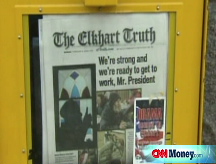Bernanke grilled by Congress
Lawmakers questioned whether the central bank should continue to have broad unchecked powers to intervene in the economy.
NEW YORK (CNNMoney.com) -- Federal Reserve chairman Ben Bernanke was questioned by lawmakers from both parties Tuesday about whether the Fed should continue to have as much broad powers over the economy.
Bernanke, appearing before the House Financial Services Committee, was scheduled to talk about the moves the Fed has taken to deal with the credit crunch and recession.
But Barney Frank, D-Mass., chairman of the committee, said in opening remarks that it did not seem "healthy" for the Fed to have as much power with "very few restrictions."
Frank said he was not criticizing any specific steps that Bernanke has taken to address the financial crisis in recent months, nor did he suggest there should be any immediate change.
"I think much of what they've done has been useful. I think the power has been very responsibly wielded," he said.
Rep. Spencer Bachus, R-Ala., the ranking Republican on the committee, expressed greater concerns about the powers of the Fed and the fact that many of the agreements it has reached with specific companies are not open to public scrutiny or congressional oversight.
"At this time, because we know almost nothing about these transactions, we can only guess as to their ultimate success or failure," Bachus said in his opening remarks.
Bachus added that the Fed's various policy moves in recent months were a "series of ad hoc decisions and seeming policy reversals which gives an indication that there is in fact no detailed plan to navigate us through what we all agree is troubling times."
Bernanke defended recent moves by the Fed, including intervention to stop the bankruptcy of Bear Stearns and insurer American International Group (AIG, Fortune 500) in 2008.
He said the Fed entered into those deals very reluctantly, but added that he does not expect the central bank to lose money on either of them. (The Fed agreed to backstop potential losses tied to Bear Stearns when JPMorgan Chase (JPM, Fortune 500) bought the investment bank. And the Fed bought a majority stake in AIG.)
Still, some members of the committee expressed concerns about how safe the Fed's balance sheet is following all its new liquidity programs.
"You'd be on a watch list if you weren't the Federal Reserve," said Rep. Randy Neugebauer, R-Texas.
Bernanke said he's confident that the profit the Fed is going to make on all its lending programs will easily offset any possible losses.
While he acknowledged that there were risks to the Fed and taxpayers from those deals, he said other programs, such as the purchase of mortgage-backed securities and commercial paper, were very safe.
Still, Bernanke conceded that even after pumping $1.9 trillion into the economy, there was more work that needed to be done to respond to the economic and financial problems.
"Although the provision of ample liquidity by the central bank to financial institutions is a time-tested approach to reducing financial strains, it is no panacea," he said in his opening statement.
He said that the Fed's actions had helped to reduce mortgage rates, improve access to credit for major businesses and stabilize the money market industry.
But he added that "all of these improvements have occurred over a period in which the economic news has generally been worse than expected and conditions in many financial markets, including the equity markets, have worsened."
Bernanke also signaled the Fed is not done with its unusual efforts to pump money into the economy, saying the Fed's balance sheet should "expand somewhat more."
Pressed on that comment, he pointed to the announcement earlier Tuesday of an agreement between the Treasury Department and the Fed to increase a program aimed at boosting the availability of credit to consumers and small businesses from $200 billion to $1 trillion.
Bernanke's testimony also followed the unveiling of the Obama administration's new bank rescue plan by Treasury Secretary Tim Geithner.
And it comes shortly after the Senate approved an $838 billion economic stimulus plan to jumpstart the economy. Congress must still vote on a reconciled bill before President Obama will be able to sign stimulus into law.
During the question and answer portion of the hearing, Bernanke made passing references to Treasury's new bank rescue plan, generally voicing support.
But Bernanke also defended the heavily criticized bailout that he and former Treasury Secretary Henry Paulson persuaded Congress to pass last fall.
"I think the actions that were taken prevented a much worse situation, a catastrophic meltdown," he said.
This is Bernanke's first appearance on Capitol Hill since the Fed cut its key interest rate to near 0%. He vowed to improve reporting on steps the Fed will take beyond rate cuts, including changes in its balance sheet that are funding some of its efforts to improve credit. ![]()


